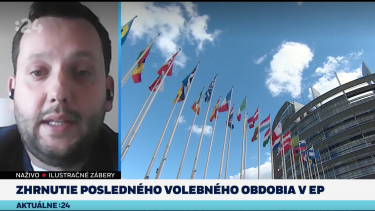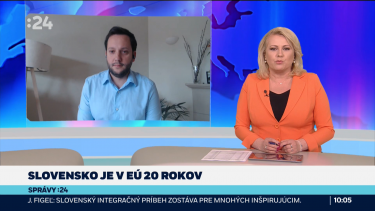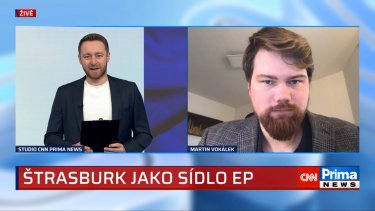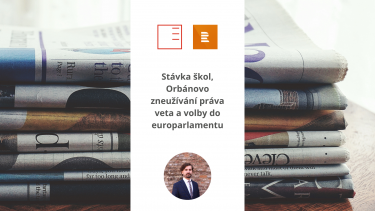RTVS | The Last Parliamentary Term in the European Parliament
What was the last parliamentary term like in the European Parliament? How did it manage two crises – the war in Ukraine and COVID-19? And how can the aid to Ukraine be assessed? Žiga Faktor, Deputy Director and Head of the Brussels Office of EUROPEUM Institute, answers these and other questions in an interview for Slovak television RTVS.
Show more
RTVS | Slovakia has been in the EU for 20 years
Slovakia joined the European Union 20 years ago in its biggest enlargement to date. Among the main benefits of this move is an increase in the economy, up to 80%. Žiga Faktor, deputy director and head of EUROPEUM Institute's Brussels office, described the future direction of the Union.
Show more
CNN Prima News | Two plenary session locations of the European Parliament
The MEPs discussed the difficulty of changing the seat of the European Parliament, which periodically moves from Belgium to France. Most agreed that they would welcome if this movement was canceled. However, France would probably veto such a change in the treaties. What are the arguments for and against moving the European Parliament periodically? Is there any way out of this problem, or will Strasbourg's role remain the same for decades to come? Martin Vokálek, Director of EUROPEUM Institute for European Policy, commented for CNN Prima News on the issue.
Show more
Respekt | Is the veto fulfilling its function in EU or has it become a tool for blackmail?
Although Viktor Orbán didn't make good on his threat to veto the EU aid proposal for Ukraine, his actions have opened a debate on the need for a veto in the EU. Does it still make sense or has it become a blackmail tool? Even now, the veto isn't the only way to block a proposal. In addition to it, unanimity may be threatened by the so-called blocking minority, in which a group of at least four states representing at least 35% of the EU population can prevent a proposal from being presented. Viktor Daněk, deputy director of the EUROPEUM Institute, commented on the Czech Republic's position in the EU and the possible reform of the approval mechanisms for the weekly Respekt.
Show moreČRo Plus | What convinced Viktor Orbán to veto financial aid to Ukraine?
Listen to the interview with Žiga Faktor, deputy director and head of our Brussels office, about what convinced Viktor Orbán not to veto financial aid to Ukraine?
Show more
CNN Prima News | Orbán has been softened by the unblocking of EU subsidies. He did not veto the accession talks with the new states
The Hungarian leader has traded his consent to accession talks with Ukraine, Moldova and Bosnia-Herzegovina for European money. Or so it seems, given that right before the EU leaders' summit he announced that he would veto the move. Our deputy director Viktor Danek spoke about Hungary's position in an interview with CNN Prima News.
Show moreAnalysis | Gradual Integration Process: Towards Restoring Effectiveness And Credibility Of EU Enlargement
Discussions on further changes to the enlargement methodology may reinforce the image of EU membership as a moving target with constantly changing rules, especially as the current methodology has still not been fully applied. Within the framework of the current methodology, the European Commission should develop a new strategy that would specify its approach to the gradual integration of (potential) candidates into the EU and the conditions governing this process. The 2018 Western Balkans Strategy set out initiatives, some of which are still valid today and can serve as the basis for a new enlargement strategy. Writes Jana Juzová, Senior Research Fellow.
Show more PDF
ČRo Plus | The school strike, Orbán's veto abuse and the European elections
Our deputy director Viktor Daněk prepared a selection of news from Monday's press for the morning broadcast of Czech Radio Plus. He talked, for example, about the major school strike or selected European topics.
Show moreTV Nova | Hungary before the European Parliament elections
The election campaign for the European Parliament elections in Hungary has begun, and according to expectations, it is quite sharp. But what is Hungary's real position in the current European Union? And how might the proposed reforms or enlargement of the Union change it in the future? Our deputy director Viktor Daněk commented on the issue in an interview with TV Nova.
Show moreČT24 | Veto power in the European Union: a brake or a guarantee of compromise?
The veto in the European Union gives power to Member States and guarantees the principle of compromise solutions. But what can it mean for the future vision of an enlarged Union? Žiga Faktor, deputy director and head of our Brussels office, discussed this topic in an interview for Horizont 24 on ČT24.
Show more
Staroměstské náměstí 4/1
Prague 1 - Staré Město
110 00
tel.: +420 212 246 552
email: europeum@europeum.org
https://www.europeum.org








